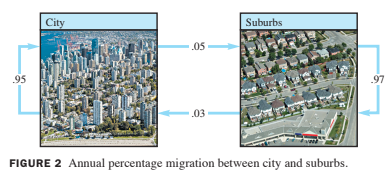Ch01.10 Linear Models in Business, Science, and Engineering
01.10.02 : Difference Equation
- In many fields, a dynamic system that changes over a time should be mathematically modeled.
- Several features of the system are each measured at discrete time intervals, producing a sequence of vectors, .
- The entries in provide information about the state of system at the time of the th measurement.
- If there is a matrix such that , and , in general
- then it is called a linear difference equation (or recurrence relation)
- Given such an equation, one can compute , and so on, provided is known.
- The discussion below illustrates how a difference equation might arise.
- A subject of interest to demographers is the movement of populations or groups of people from one region to another. The simple model here considers the changes in the population of a certain city and its surrounding suburbs over a period of years.
- Fix an initial year-say,2019- and denote the populations of the city and suburbs that year by and , respectively. Let be the population vector
- For 2020 and subsequent years, denote the populations of the city and suburbs by vectors
- Our goal is to describe mathematically how these vectors might be related.
- Suppose demographic studies show that each year about 5% of the city's population moves to the suburbs (and 95% remains in the city), while 3% of the suburban population moves to the city (and 97% remains in the suburs). See Fig.2 below:

- After 1 year, the original persons in the city are now distributed between city and suburbs as
- The so persons in the suburbs in 2019 are distributed 1 year later as
- The vectors in (6) and (7) account for all of the populations in 2020. Thus
- That is,
- Where is the migration matrix determined by the following table:
- Equation (8) describes how the population changes
from 2019 to 2020. If the migration percentages
remain constant, then the change from 2020 to 2021
is given by
- And similarly for 2021 to 2022 and subsequent years. In general,
- The sequence of vectors describes the population of the city/suburban region over a period of years.
